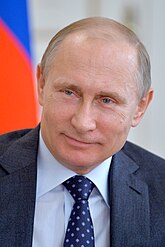President of the Russian Federation
| President of the Russian Federation Президент Российской Федерации |
|
|---|---|

Standard of the President of the Russian Federation
|
|
| Style |
Mr. President (formal) Comrade Supreme Commander (among the military) |
| Member of |
State Council Security Council Supreme Council of the Eurasian Economic Union |
| Residence |
Kremlin Senate (working) Grand Kremlin Palace (ceremonial) Novo-Ogaryovo (residential) |
| Seat | Moscow |
| Appointer | Direct popular vote |
| Term length | Six years (one consecutive re-election) |
| Inaugural holder | Boris Yeltsin |
| Formation |
1991
|
| Succession | Prime Minister of Russia |
| Salary | 3.6 million rubles annually |
| Website |
(Russian) президент.рф (English) eng.kremlin.ru |
1991
The President of the Russian Federation (Russian: Президент Российской Федерации, tr. Prezident Rossiiskoi Federatsii) is the elected head of state, Supreme Commander-in-Chief and holder of the highest office within the Russian Federation. However, he is not the head of the executive branch. The Government of Russia is the highest organ of executive power. The current President of Russia is Vladimir Putin.
In 1991, the office was briefly known as the President of the Russian Soviet Federative Socialist Republic (Russian: Президент Российской Советской Федеративной Социалистической Республики) until 25 December 1991. According to the 1978 Russian Constitution, the President of Russia was head of the executive branch and headed the Council of Ministers of Russia. According to the current 1993 Constitution of Russia, the President of Russia is not a part of the Government of Russia, which exercises executive power.
In all cases where the President of the Russian Federation is unable to fulfill his duties, they shall be temporarily delegated to the Prime Minister, who becomes Acting President of Russia. The Chairman of the Federation Council is the third important position after the President and the Prime Minister. In the case of incapacity of both the President and Prime Minister, the chairman of the upper house of parliament becomes acting head of state.
...
Wikipedia

